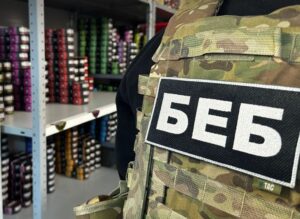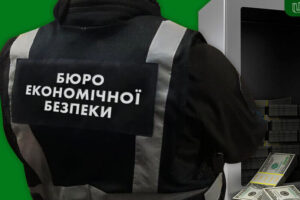
The Bureau of Economic Security (BES) has ensured that the state budget receives more than UAH 13.4 million in taxes refunded by a Lviv-based holding company that includes 60 restaurants and retail outlets, the bureau’s press service reports.
According to the report, the investigation found that the holding’s employees received their salaries in two installments, one of which was paid through shadow registers. During the pre-trial investigation, the BES detectives conducted a series of searches, interrogated the company’s employees and collected the necessary evidence.
In addition, the Bureau initiated a tax audit to determine the correctness of the company’s tax and fee payments. As a result of the audit, an additional UAH 13.4 million in taxes and fees were accrued, the press release said.
“The company’s director pleaded guilty at the pre-trial investigation stage. The company has paid to the state budget the damages caused to the state in full. The person involved in the criminal case was served a notice of suspicion of committing criminal offenses under Part 2 of Article 212, Part 3 of Article 212-1 of the Criminal Code of Ukraine,” the Bureau said.
According to the BES, the case has been sent to court. The pre-trial investigation was conducted by detectives of the BES territorial office in Lviv region. Prosecutors of the Lviv Regional Prosecutor’s Office are in charge of the proceedings.
As reported, on October 17, 2023, the BES announced the exposure of a large-scale tax evasion scheme in Lviv by a holding company that includes 60 restaurants and retail outlets. On the same day, Yuriy Nazaruk, co-owner of the !Fest holding, reported that the BES and the Security Service of Ukraine conducted searches at one of the holding’s sites in Lviv. According to him, the searches were related to the holding’s business activities, but there were no requests or appeals from law enforcement officers in connection with criminal cases.
The !Fest holding was founded in 2007. It develops a network of creative restaurants, cafes, shops and real estate in Ukraine. Its owners are Andriy Khudo, Yuriy Nazaruk, and Dmitry Gerasimov.

Detectives of the BES in Odesa region have completed a pre-trial investigation into an organized criminal group that counteracted legitimate business activities and seized real estate of foreign companies in Odesa and Kyiv. The property worth UAH 29 million has already been returned to the owner.
During the pre-trial investigation, detectives established that in almost a year and a half, the criminal group appropriated 4 apartments in Odesa, a land plot and a house in the capital belonging to foreign companies.
For this purpose, the members of the organized crime group set up a scheme of illegal re-registration of real estate for its further sale. With the help of “black” realtors, they created fictitious companies. Using forged seals of non-residents, authorities and notaries of foreign jurisdictions, they contributed real estate to the authorized capital of the above-mentioned companies. Later, they re-registered the real estate by entering into sale and purchase agreements and other transactions. The total amount of losses incurred is UAH 41 million.
The property worth UAH 29 million has already been returned to one of the affected foreign companies – detectives initiated the cancellation of the registration of alienation of ownership of a land plot and a house in the capital.
The organizer and 3 members of the criminal group were served a notice of suspicion of committing criminal offenses stipulated by Part 2 Art. 205-1, Part 3 Art. 206-2, Part 3 Art. 209, Part 3 Art. 3 Art. 209, Art. 358(3), (4) of the Criminal Code of Ukraine.
Two persons were chosen as a measure of restraint in the form of detention, and two others were released on bail. The indictment against 4 persons was sent to court.
Operational support was provided by the Strategic Investigations Department in Odesa region of the State Secret Service of the National Police of Ukraine. Procedural supervision – Odesa Region Prosecutor’s Office.
Recently, a Spanish citizen Angel Miguel Cerezo Gallardo publicly appealed to Ukrainian state authorities for support. The Spanish investor estimates his losses from the raider seizure of Selecto Markets, the company he co-founded, at UAH 20 million. For more details, please follow the link – Video of the press conference is available here

In 2023, the Bureau of Economic Security (BES) reimbursed UAH 2.2 billion to the budget and transferred property worth UAH 43.7 billion to the ARMA, said Serhii Kryvun, head of the BES Main Detective Unit.
“As for state expenditures for the maintenance of the Bureau of Economic Security, they amounted to UAH 757 million in 2023. In its turn, during pre-trial investigations in criminal proceedings, the Bureau compensated damages worth over UAH 2.2 billion and seized property of companies and individuals worth over UAH 43 billion. This property has been transferred to the ARMA,” he said in an interview posted on the BES Telegram channel on Saturday.
He named the three most high-profile cases of the BES. “This is the case of Dmytro Firtash. Officials of a number of regional gas companies caused losses to the gas transmission system operator in the amount of more than UAH 4.2 billion in 2021,” Kryvun said.
“The next case we can talk about is the case related to the activities of Ukrtatnafta. It was established that during 2022, since the full-scale invasion, the company’s officials had been abusing their official position and evading taxes. The fact of embezzlement of imported oil resources – Azerbaijani oil – worth more than UAH 2 billion was also established,” added Kryvun.
Another high-profile case, according to him, “is the proceedings in which the clandestine production of consumer goods was discovered in Mezhyhiria Park. Among them were household chemicals and food… During the pre-trial investigation, the circle of people who organized this production was established.”
According to the BES representative, there were also a number of high-profile cases involving the importation of branded goods and cars that were declared as humanitarian aid or aid to the Armed Forces and then appeared on open sale, for example, through OLX.

The European Business Association (EBA) has appealed to the Chairman of the Verkhovna Rada Ruslan Stefanchuk not to vote for the draft laws No. 10439-10440 on the reform of the Bureau of Economic Security (BES) and amendments to the Criminal Procedure Code and other legislative acts to improve the work of the BES and to finalize the draft laws No. 10088 and No. 10088-1 on the reboot of the BES, which were previously registered in the Rada.
As noted in the EBA statement on Wednesday, the government’s draft law, in particular, does not specify the timeframe for the formation of a renewed BES team after the election of the head, and the re-certification of employees is postponed until after the war.
“For several years, the European Business Association has been emphasizing the need to reboot the BES in order to improve its efficiency and mitigate corruption risks that may arise in the work of this state body, which is responsible for combating economic crime and smuggling,” the EBA emphasizes.
The Association insists that the selection of key positions at the BES should be carried out on a competitive basis, and that it is extremely important and of top priority to appoint an effective leader who will continue to form the team. Therefore, the competition commission should propose to the Prime Minister one, not three, candidates for the position of director in order to avoid possible political influence on such an appointment.
According to business representatives, re-certification of all BES employees is necessary after the election of a new head, and all economic crimes (after the reform) should be within the BES’s competence.
Regarding the criticism of Draft Law No. 10440, the EBA pointed out the difficulty of implementing some of its provisions, in particular, the involvement of the Business Ombudsman Council in searches and seizures in BES proceedings. In addition, according to the association, some provisions duplicate or contradict others, for example, the failure to involve representatives of other law enforcement agencies in investigative actions.
As reported, on October 13, 2023, the Verkhovna Rada Committee on Finance, Taxation and Customs Policy recommended that the Parliament adopt as a basis the draft law No. 10088 “On Priority Measures for Reforming the BES” and its alternative No. 10088-1. This draft law was also supported by the Ministry of Finance and the Ministry of Economy, and the Ministry of Justice made comments.
Later, on December 29, 2023, the Cabinet of Ministers approved its draft law on reforming the BES, which declares a reboot of the Bureau a year after the war. It was sharply criticized by Vitaliy Shabunin, head of the Anti-Corruption Action Center, and Yaroslav Zheleznyak, first deputy head of the parliamentary committee in charge. According to them, in this form, the control over the BES will be retained by the President’s Office, and the IMF will not count this structural beacon.
As a result, the government postponed submitting the draft law to the Rada for a month, but even after it was finalized, it was criticized.

Based on the results of the analysis of export operations with agricultural products, BES analysts found that over 9 months, risky enterprises exported grain of unknown origin for UAH 133.9 billion. This is more than 20% of the total amount.
Currently, the Bureau of Economic Security has submitted its proposals to the Cabinet of Ministers of Ukraine to minimize risks in this sector of the economy.
One of the most common methods of “black” grain exports is the use of risky enterprises. They are set up in advance to export unaccounted-for grain purchased for cash.
In other words, farmers grow grain and sell it for cash to companies that are usually registered to front companies and do not engage in regular business activities.
These companies do not submit documents on the origin of the grain or declare fictitious producers in their customs declarations.
After the grain leaves Ukraine, it is resold several times and then legally reaches the final buyer. As a result, foreign currency earnings do not return to Ukraine, and the budget does not receive any revenues, as the exporting companies are fictitious.
Usually, the final buyer of grain is a non-resident company that transfers the money for the goods to another non-resident company related to a Ukrainian exporter.
There is also a scheme in which foreign currency is transferred to the current accounts of a non-resident, who then buys the goods, for example, in China and imports them to Ukraine to sell them for cash and to give other companies a tax credit.
To counteract offenses in this area, employees of the Economic Security Bureau constantly analyze export operations. Based on the results of such analysis, 43 analytical products and certificates were created, and almost 4,500 orders to initiate inspection (re-inspection) of goods were sent to the State Customs Service. For example, according to the BES in Odesa region, the customs office refused to clear 75 customs declarations totaling 1.6 million tons worth more than $430 million.
As part of 22 criminal proceedings, BES detectives served notices of suspicion to 12 officials of “risky” grain exporters for committing crimes under Articles 212 and 205-1 of the Criminal Code of Ukraine, conducted 71 searches, and sent 12 criminal proceedings to court. The courts have issued 8 indictments.

Employees of the territorial department of the Bureau of Economic Security (BES) in Lviv region exposed a scheme for the illegal production and sale of alcoholic beverages in Ternopil and Lviv regions, the press service of the BES regional office reports.
“The investigation revealed the location of warehouses with vodka and cognac. The alcoholic beverages were delivered to one of the enterprises in Lviv, which distributed counterfeit alcohol through retail stores,” the statement said.
Counterfeit alcohol was distributed in a network of more than 300 stores.
“During the searches in Ternopil, about 61 thousand liters of liquid with the smell of alcohol and an alcohol production line were seized,” the BES reports.
At the same time, law enforcement officers seized more than 46 thousand liters of counterfeit alcohol, as well as containers and equipment for packaging alcoholic beverages, and financial and business documents at the company’s premises in Lviv region.
“According to the decision of the Lychakiv District Court of Lviv, the seized property worth more than UAH 26 million was seized,” the statement said.